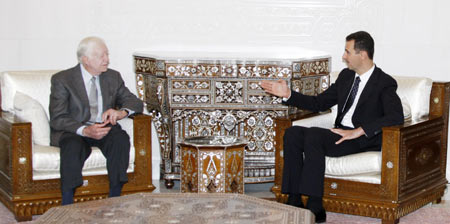Syria welcomed the current visit by former U.S. President Jimmy Carter who held talks with Syrian President Bashar al-Assad, a Foreign Ministry official said hereon Friday.
 Syria's President Bashar al-Assad (R) meets former U.S. President Jimmy Carter in Damascus April 18, 2008. (Xinhua/Reuters Photo)
Syria's President Bashar al-Assad (R) meets former U.S. President Jimmy Carter in Damascus April 18, 2008. (Xinhua/Reuters Photo)
Bushra Kanafani, Director of the Information Department of the ministry, said in a statement that Syria also appreciated Carter's meeting with exiled Hamas politburo chief in Damascus Khaled Meshaal, which reflects his attention to pressing problems in the region.
According to the schedule of Carter's visit here, Syrian President Bashar Assad would host a family lunch for Carter, followed by a formal meeting on Syrian-American relations, said Kanafani.
During the meeting, Assad explained Damascus' point of view on the overall situation in the region, particularly in Lebanon, Iraq and the Palestinian territories.
On whether Carter had asked Damascus to mediate with Hamas to release captured Israeli soldier Gilad Shalit, Kanafani said Carter might have presented the request because of his concern in this regard.
Syrian political circles also welcomed Carter's visit, saying although his talks with Damascus and Hamas were criticized by the U.S. administration, there are still personalities and institutions in America which supported and encouraged his tour here, which also aroused anger and dismay in Israel.
According to the official SANA news agency, Assad and Carter expressed their support to the principle of dialogue to find political solutions to Middle East problems during their talks.
The two sides stressed the importance to achieve a just and comprehensive peace in the region and the need to rally international support to break the siege on the Palestinian people in Gaza to alleviate their suffering.
Assad and Carter also discussed bilateral ties as well as the peace process and the latest development in the region, particularly in the Gaza Strip, Iraq and Lebanon.
Carter, who paid three visits to Syria in 1983, 1987 and 1990,voiced his relief for Syria's constructive role in finding solutions for outstanding issues in the region, SANA reported.
Later, Carter held a meeting with Damascus-based exiled Hamas leader Khaled Meshaal on peace efforts in the region, Moussa Abu Marzouk, deputy chief of the exiled Hamas politburo, confirmed to reporters.
Their talks focused on three basic topics, namely the fate of Israeli captive Gilad Shalit, to appease the situation in Gaza and the lift of the siege there, Abu Marzouk said.
Although the policy of Hamas was not to make any contact with the Israelis, the issue of the Israeli captive Shalit could be discussed through indirect channels as the movement did not reject negotiation with Israel through intermediaries, Abu Marzouk said.
Carter's stop in Damascus and meeting with Hamas officials have drawn criticism from both the U.S. administration and Israel.
On Monday, the White House urged Carter not to meet Hamas leaders, saying his meeting with Hamas was only "in his own private capacity, as a private citizen," not representing the United States.
In response, Carter reasserted the same day in Israel that Syria and Hamas must be involved in any future peace deal.
"I think it's absolutely crucial that in a final dreamed-about and prayed-for peace agreement for this region that Hamas be involved and that Syria be involved," he said.
Carter, aged 83, also held talks on Thursday with a Hamas delegation in Cairo after Israel prevented him from entering Gazato meet Hamas officials.
The White House immediately rebuked the meeting, criticizing that "we do not think that meeting was useful. As we can all see by the recent violence in Gaza, Hamas is a terrorist organization."
Carter kicked off a week-long trip to the region on Sunday with a personal effort aiming at pushing Israeli-Palestinian peacetalks.
(Xinhua News Agency April 19, 2008)